塑料抽屉模具设计(含CAD零件图装配图,UG三维图)
无需注册登录,支付后按照提示操作即可获取该资料.
塑料抽屉模具设计(含CAD零件图装配图,UG三维图)(任务书,论文说明书13500字,CAD图13张,UG三维图)
摘 要
本次的设计为抽屉的结构及其成型模具设计,首先对抽屉的结构分析和设计,然后对产品用UG进行三维建模,最终进行注塑模具设计,产品壁厚比较均匀,适合中大批量生产,然后再分析该产品的特性特征,它的用途、作用以及它的结构特征怎么做,然后结合它在生活的用途和性能、以及结合材料的特性确定该产品的材料为ABS。
分析完产品本身以后首先需确定该产品的分型面,这一步至关重要,通常采用产品最大端面处为分型面。然后再用UG测量出该产品的最大尺寸多少,结合实际确定出一模几腔满足实际加工要求,经过综合分析为一模两腔的型腔布局,布局规则和均匀,然后选择合适的模架即可。流道尽可能的设计在塑件中间,保证其良好的充填性,本次采用侧浇口。本次设计的产品难度和结构一般,就利用分型面自然排气,不用单独设计排气系统。再者,水道也要设计得均匀的冷却产品,不可离流道太近,再者就是水道和产品距离需要大于5mm。本次设计顶杆分布均匀顶出塑件,可以在塑件脱模之后的质量得到保证。设计完了以后就对模具进行参数校核,然后确定各个结构之间配合是否符合设计要求,对比,不符合要求的微作调整。然后检查完成以后就导出二维图在CAD里面进行标注,整理图档。
关键词:抽屉;三维建模;模架;注塑模具设计;校核
Abstract
This design is the structure of the egg storage container and the design of the molding mold. First, the structure of the egg storage container is analyzed and designed. Then, the product is 3d modeled by Ug, and finally, the injection mold is designed, the Wall thickness of the product is relatively uniform and suitable for mass production, and then analyze the characteristics of the product, its use, function and how its structural characteristics are done, then combined with its use in life and performance, as well as the characteristics of the combination of materials to determine the product materials for ABS. After analyzing the product itself, the parting surface of the product should be determined first, which is very important. Then, the maximum size of the product is measured by Ug, and a few cavities in one mold are determined to meet the actual processing requirements. After comprehensive analysis, the cavity layout of one mold and two cavities is found to be regular and uniform, then select the appropriate mould base. The runner is designed as far as possible in the middle of the plastic part to ensure its good filling, this time using side gate. The design of the product difficulty and structure in general, the use of parting surface natural exhaust, exhaust system design does not need to be separate. In addition, the water channel should be designed to uniform cooling products, not too close to the channel, and the distance between the water channel and the product should be greater than 5mm. In this design, the ejector rods are evenly distributed to push out the plastic parts, which can ensure the quality of the plastic parts after demoulding. After the design of the mold on the parameters check, and then determine whether the various structures with the design requirements, contrast, do not meet the requirements of micro-adjustment. And then check after the completion of the two-dimensional drawing in the CAD inside the label, finishing the drawing file.
Key words: Egg Storage Box; three-dimensional modeling; mold; injection mold design; check
塑件结构分析
本次设计塑件为抽屉,通过分析塑件然后用UG画出了它的二维和三维图,这样更加直观的可以再UG上面直接展示出来,更加的立体化。然后通过分析这个塑件,大致结构为:薄壁壳状,适合注塑生产,并且满足注塑生产条件,适合注塑生产,塑件为中等难度,典型外壳,设计时需要注意塑件的脱模,设计注意外观要求,表面粗糙度要符合设计需要,外观处不能出现缩痕等,设计课程按一般精度TM5级设计,设计过程中保留脱模斜度,通过文献脱模斜度的要求为设计在内表面35′~1°左右,次范围内可以满足脱模需要,
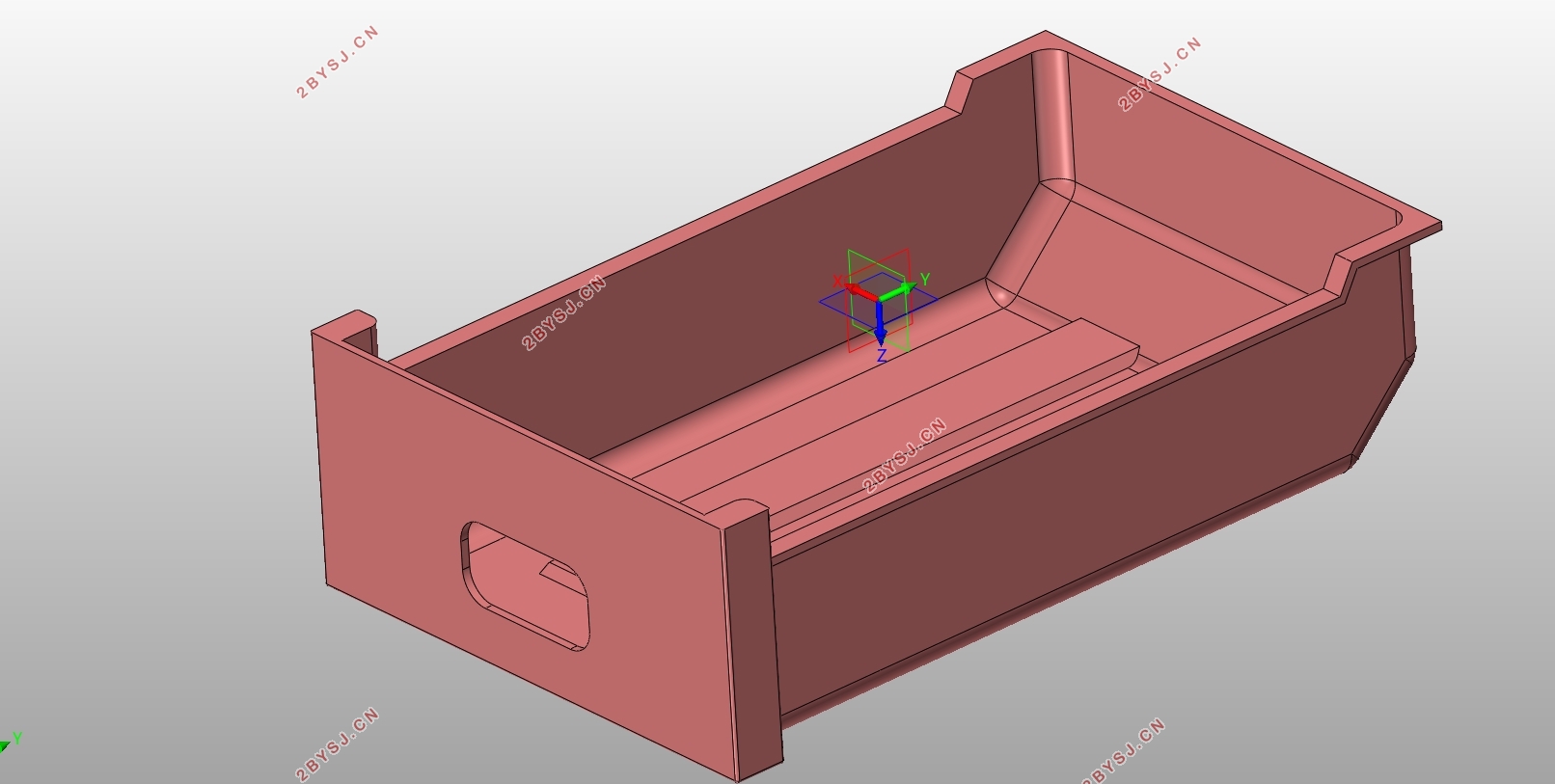
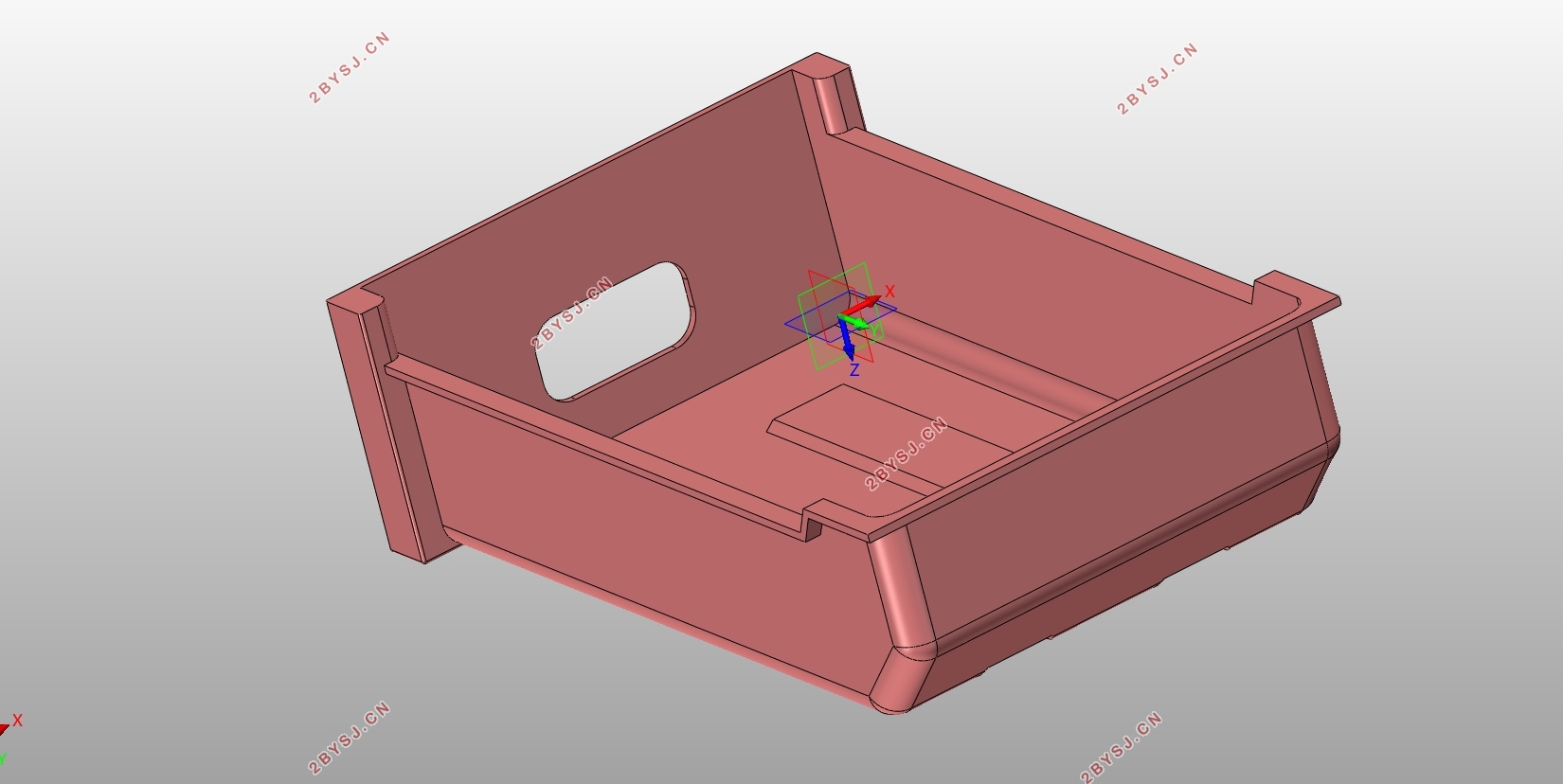
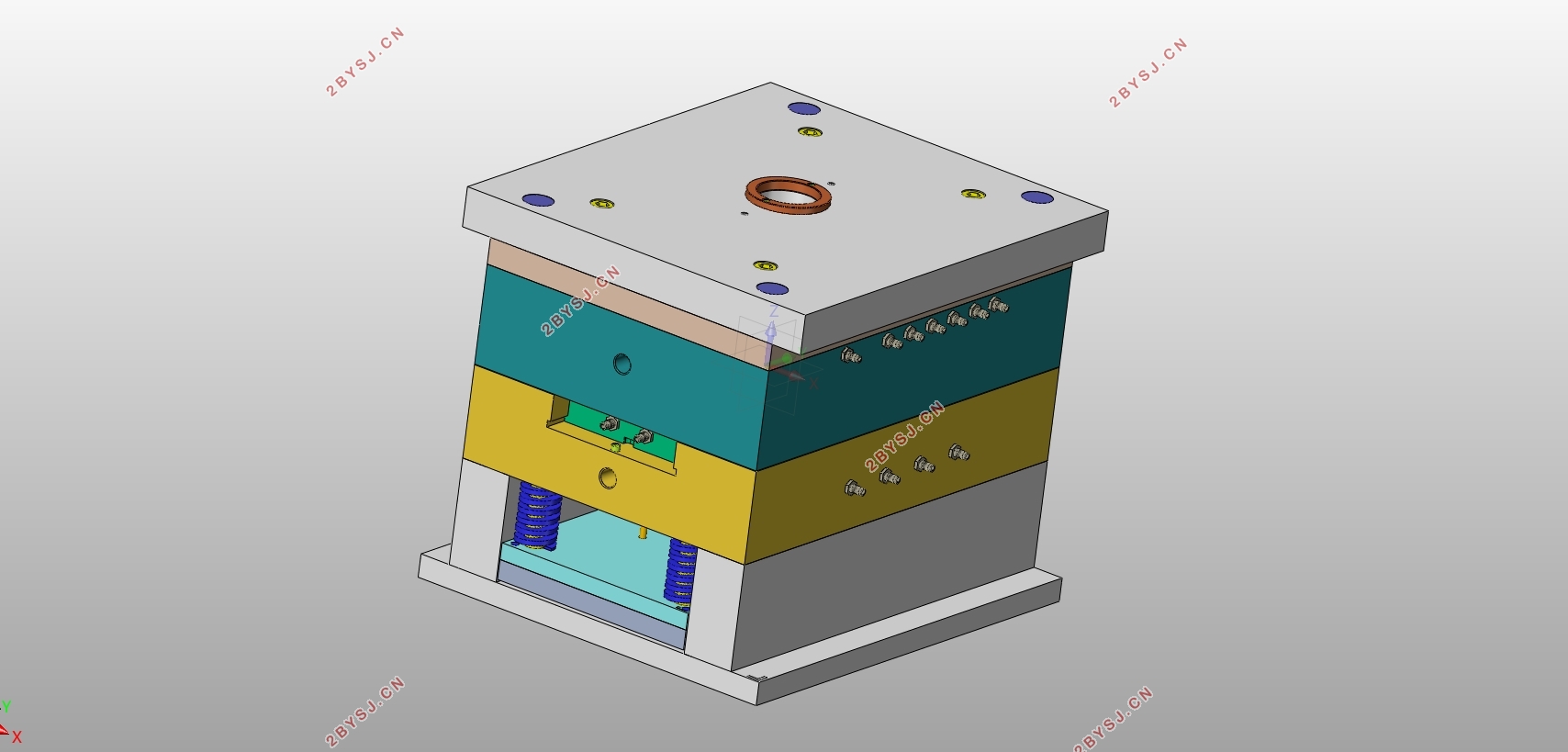
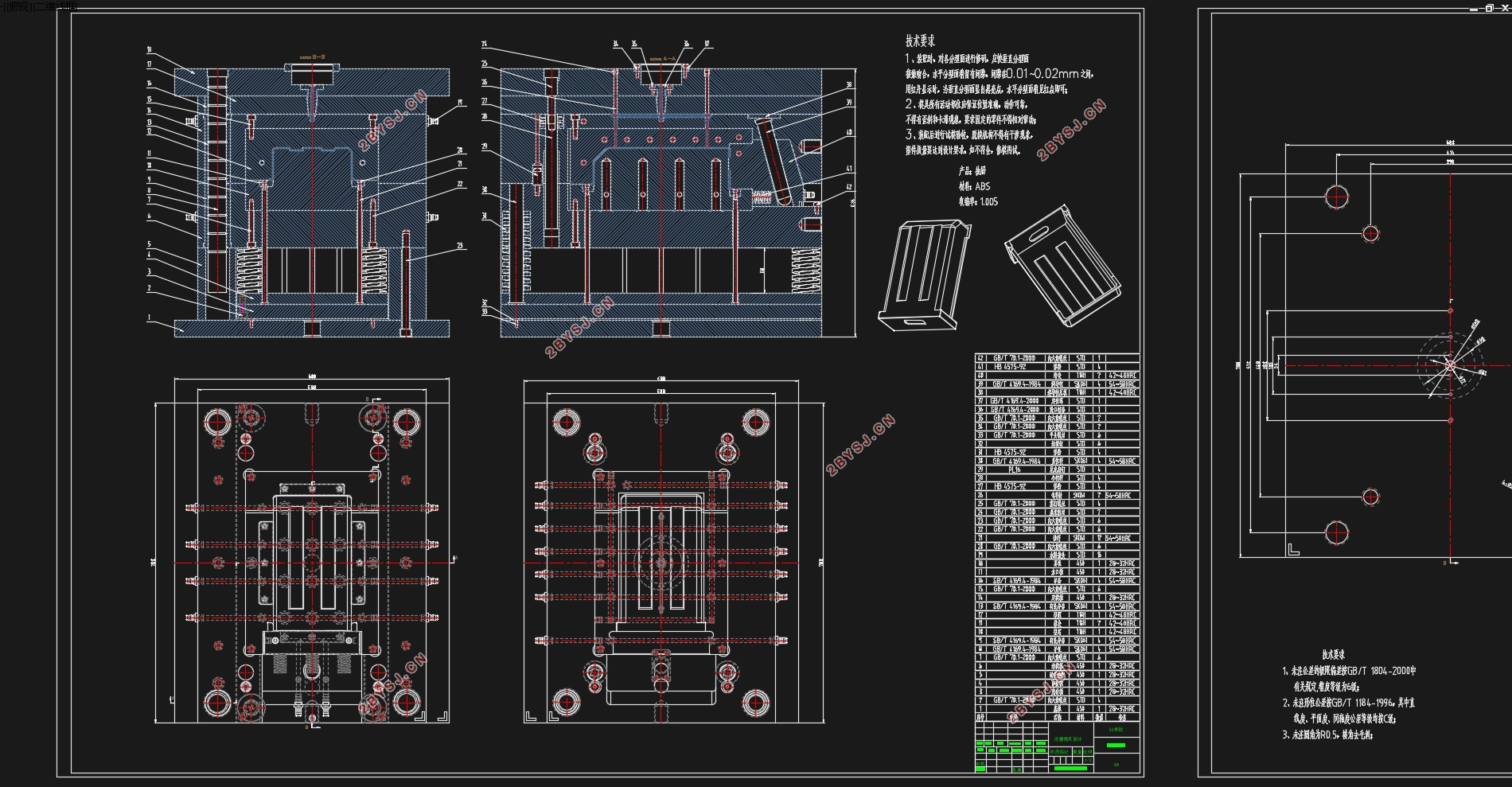

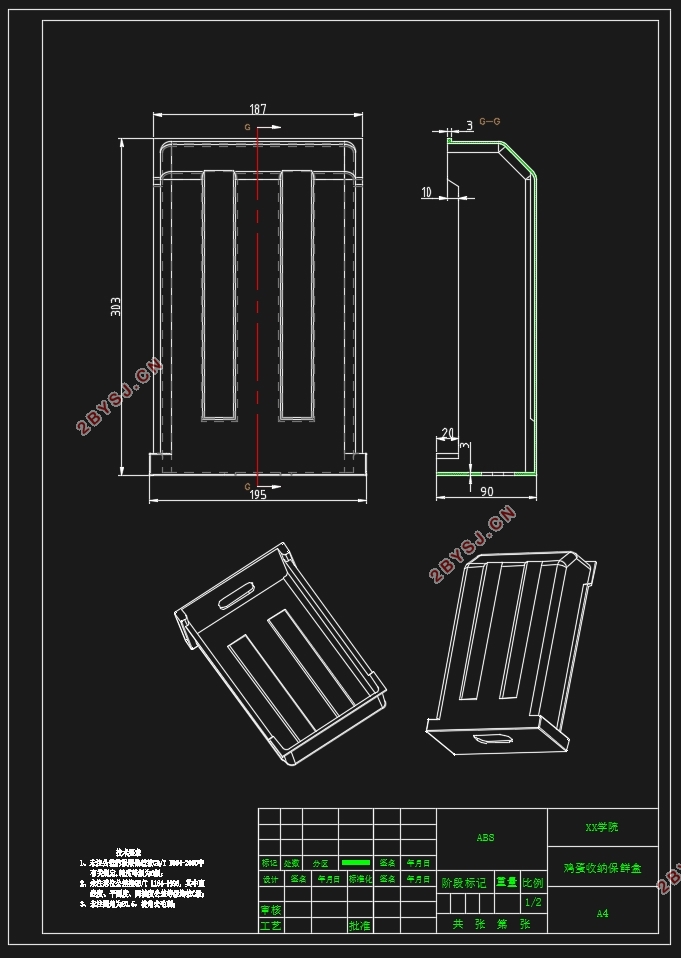

目 录
摘 要 1
目 录 3
第一章 绪论 5
1.1注塑模具的概述 5
1.2 注塑模具的发展 6
1.3模具的发展趋势 7
第二章 塑件工艺和材料分析 8
2.1 塑件结构分析 8
2.2 塑件材料的选用及性能分析 9
2.3 塑件的体积质量计算 9
2.4 塑料成型设备的选用 10
第三章 注塑模具的设计 12
3.1 分型设计 12
3.2 型腔的布局 12
3.3 浇注系统 13
3.3.1 模具主流道设计 13
3.3.2 模具分流道设计和计算 14
3.3.3 浇口的设计 15
3.4 冷料穴和拉料杆的设计 15
3.5 排气机构的设计 16
第四章 成型零件的设计 17
4.1 型腔的结构设计和尺寸计算 17
4.2 型芯的结构设计 18
4.3成型零件钢材选用 20
第五章 模具冷却系统设计 21
5.1 冷却系统的概述 21
5.2 冷却系统设计原则 21
5.2.1计算塑件每小时注射量 21
5.2.2 计算范围时间内的释放热量Q 22
5.2.3 水的体积流量 22
5.2.4 求冷却水道直径d 23
第六章 注塑模具其他机构的设计 24
6.1 顶出系统的设计 24
6.2 复位机构概述和设计 25
6.3 模架型号的选择 26
6.4 导柱导套的选择 27
6.5 抽芯机构的设计 27
第七章 注塑机的校核 30
7.1 注塑机注射容量的校核 30
7.2 校核压力 30
7.3 校核模具安装尺寸 30
7.4 校核移模行程 30
7.5 校核注塑机锁模力 31
总 结 32
致 谢 33
参考文献 34
